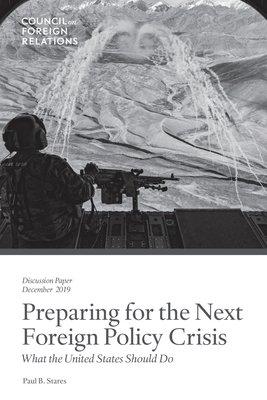

 Council on Foreign Relations Press
Council on Foreign Relations Press
Preparing for the Next Foreign Policy Crisis: What the United States Should Do


Key Metrics
- Paul B Stares
- Council on Foreign Relations Press
- Paperback
- 9780876097847
- 9.02 X 5.98 X 0.22 inches
- 0.33 pounds
- Political Science > International Relations - General
- English
 Secure Transaction
Secure TransactionBook Description
Managing foreign policy crises has become a recurring challenge for U.S. presidents. Since the end of the Cold War, there have been one hundred twenty occasions in which a threatening development overseas triggered a period of intense, high-level deliberation about what the United States should do in response (see the list of U.S. foreign policy crises from 1989 to 2019). This equates to an average of fifteen crises for each four-year presidential term. Although the stakes varied from crisis to crisis, each required the president to decide--usually in pressured circumstances and with considerable uncertainty about the risks involved--whether the situation warranted sending military forces in harm's way to protect U.S. interests. On more than forty occasions, the president determined that it did. While most of these crises were eventually resolved with little or no lasting impact on U.S. interests, some festered and became more difficult and costly to address at a later date.
It is unlikely that foreign policy crises will become any less frequent or vexing for future U.S. presidents. By most appraisals, the world is entering a more turbulent and crisis-prone era. Recent actions by the United States, particularly by the Donald J. Trump administration, have contributed to this turbulence as well as to the perception that the United States may no longer be as committed to playing an active role in some regions. Such uncertainty could encourage some states and actors to test the United States' resolve; others, hedging against U.S. disengagement, could adopt policies that are inadvertently destabilizing.
Virtually every U.S. administration--certainly those in recent years--has aspired to be more proactive about managing foreign policy crises. Despite the best of intentions, however, U.S. policymakers continue to be surprised by threatening developments overseas, reacting in a belated and ad hoc fashion. This track record does not suggest that similar efforts in the future could produce better results. It is vital, therefore, that the United States devote more attention and resources to preventing potential crises from arising and being better prepared to manage them when they do. For the last ten years, the Center for Preventive Action (CPA) at the Council on Foreign Relations has closely studied how to accomplish this task. This report represents a distillation of CPA's findings and recommendations.
Videos
No Videos
Community reviews
Write a ReviewNo Community reviews